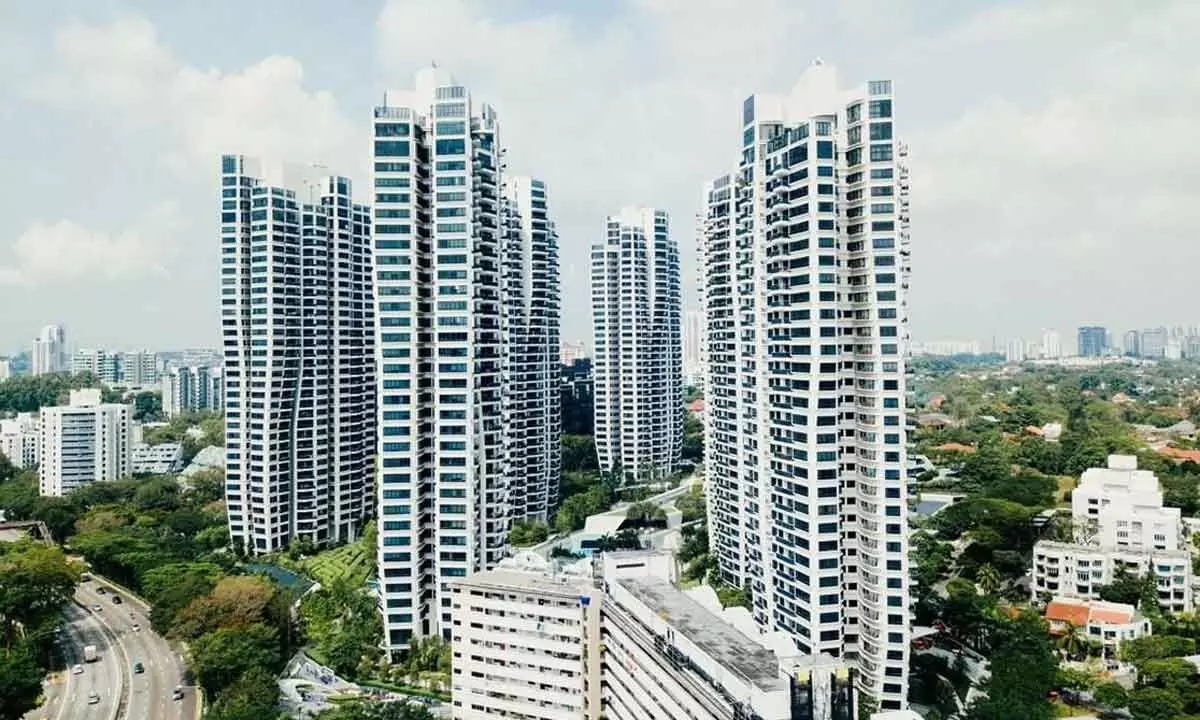RE mkt shows resilience amid strong industrial demand
While the global investor sentiment remains strong towards Indian real estate, the market continues to pose challenges in generating favorable returns relative to the cost of capital
image for illustrative purpose

With the Reserve Bank’s decision to not change interest rates for last few quarters, yields have stabilised and the cap rates have been range bound, providing environment for evaluating new investment opportunities with more informed capital stack and its risk into different asset classes
Mumbai: Markets across the Asia Pacific region face interest rate pressures, reveals the Q3 APAC Cap Rates Report by Colliers. While the global investor sentiment remains strong towards Indian real estate, the market continues to pose challenges in generating favorable returns relative to the cost of capital.
In Mumbai, the retail sector is anticipated to gain traction in the near future, driven by demand from the luxury segment and the release of additional supplies of quality organised retail assets. Mumbai industrial demand remained strong in Q3, and the compression in the cap rate was attributed to lower availability of Grade-A stock, coupled with a positive outlook from large institutional investors towards the sector. The investors were willing to trade off lower current yields for anticipated future growth in the sector.
Talking to Bizz Buzz, Ajay Sharma, Managing Director, valuation services, Colliers India says, “Central bank monetary policy decisions have been largely around inflation control which has been successful by keeping the inflation range bound. With Reserve Bank’s decision to not change interest rates for last few quarters, yields have stabilised and the cap rates have been range bound, providing environment for evaluating new investment opportunities with more informed capital stack and its risk into different asset classes.”
Given positive market movement in CRE assets, near optimum valuations have been reached in relation to larger macro factors keeping the cap rates stable. Industrial assets are still seeing cap rate compression due to sustained investment driving asset valuations north reducing the available headroom for future asset value appreciation, he said.
Across almost all the Australian cities covered, cap rates in all sectors exhibited an upward movement quarter-on-quarter industrial assets in Australia with long lease expirations and low fixed-term rent experienced downward pressure on values during the last quarter.
In China, investment activity remains subdued with only individual investors and insurance institutes actively seeking out discounted assets and adopting a cautious approach to investment. This has resulted in subdued market sentiment in the property sector for Beijing and Shanghai compared to Q2. To vitalise the market environment, the central bank of China has been lowering the Loan Prime Rate (LPR) to alleviate the burden on loans, with the objective of unlocking resources for consumption and promoting nationwide GDP growth. In Beijing and Shanghai, the industrial sector experienced a wave of new supply as the take-up of existing stock slowed down. The government’s release of more industrial and logistics land resulted in an augmented supply in the market.
Hong Kong interest rates have continued to gradually increase over the past year. Asset values are under increasing downward pressure, which is beginning to be reflected in pricing. Vacancies remain high and rental prices experienced downward pressure across all sectors.
Some investors may consider Japan a risk averse market for real estate investment since the start of the interest rate hike, primarily due to its relatively accommodative monetary policy. The sales volume of foreign investments in real estate has yet to witness a significant increase, although sentiment and interest remain strong.
The Tokyo office sector performed well in Q3, with occupancy rates remaining at a healthy level, especially when considering the challenges faced by some other cities in terms of take-up. This is driven by the return to office culture – government statistics indicate that the hybrid working ratio in Tokyo was 44 per cent in mid-2023, down from a peak of over 64 per cent in 2021.
Cap rates across sectors remain subdued, with a lack of sales evidence to support movement. Increasing lending costs are putting pressure on many investors and owners. However, there are other investors with deep pockets who are taking advantage of this opportunity to acquire assets for long-term investment.

